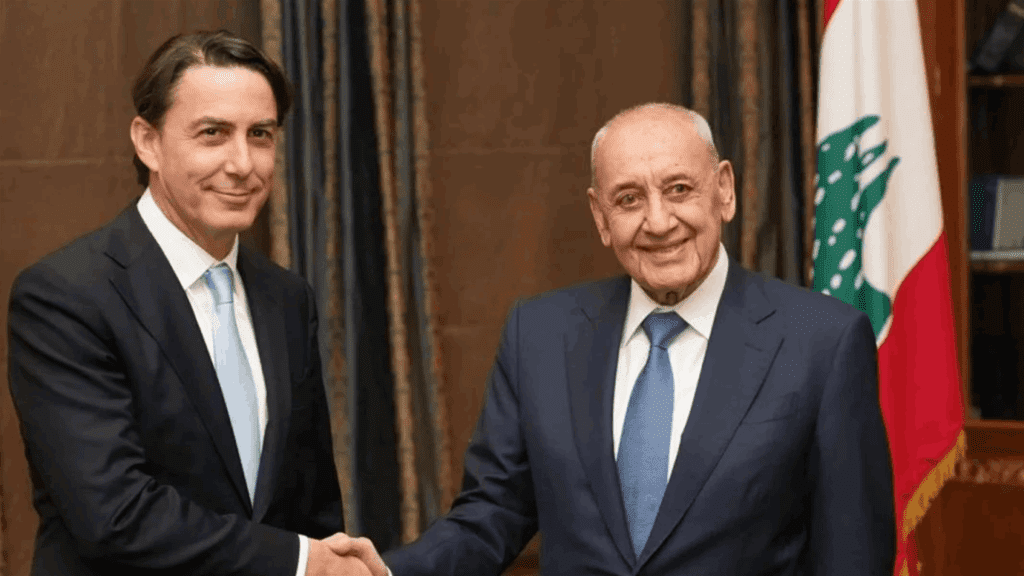United States (US) Special Envoy Amos Hochstein leaves Beirut for Tel Aviv today after intense discussions on the US ceasefire proposal, set to end the current war on Lebanon and bring about the application of UN resolution 1701.
Hochstein first visited Speaker of Parliament Nabih Berri in Beirut on Monday to discuss the latest US ceasefire proposal, and discussions dragged into Tuesday afternoon after Hochstein visited a number of Lebanese politicians, including Prime Minister Najib Mikati.
Following today’s visit, Hochstein announced that “additional progress” was made in ceasefire talks with Berri.
Hochstein was expected to come to Lebanon this week, but had briefly cancelled his trip before a quick update announcement that he was traveling again, with reports suggesting that he had originally canceled the trip awaiting positive feedback by Lebanon, which he potentially eventually received.
Monday’s meeting between Hochstein and Berri lasted longer than previous meetings, with both sitting for around two hours in Beirut to discuss the ceasefire proposal.
After the meeting, Hochstein gave a brief statement while refusing to answer any questions from the media. He expressed that the meeting was constructive and that something solid was potentially on the way.
He ended the statement, however, with a reminder that the warring parties are the ones ultimately responsible for the success or the failure of the ceasefire agreement.
Berri, on his part, expressed that the agreement proposed was good in principle, but that some details, including technical ones, still needed to be ironed out.
After concluding his second meeting with Berri on Tuesday, Hochstein refused to disclose many details surrounding the ceasefire agreement, but stated that he would be heading to Israel to try to bring talks to a close.
The Agreement
Throughout the last year of Israel’s war on Lebanon and Gaza, ceasefire talks were “intensified” on numerous occasions before eventually collapsing. The Lebanese public remains largely left out of the details of the meetings, as well as the points being discussed, and helplessly awaits the results of such talks.
Reports suggest that the proposal is mainly based on UN Resolution 1701 and entails Hezbollah withdrawing north of the Litani river and transferring military control to the Lebanese Army, to be supported by UN peacekeeping forces (UNIFIL).
Reports have suggested that points of contention focus on several matters. First, one of the proposal’s suggestions is to expand the monitoring committee to include Germany, the United Kingdom, the US and France and to expand its role to direct UNIFIL to raid locations that Israel believes contain Hezbollah weapons.
Lebanon reportedly opposed such a role and sought for the Lebanese Army to maintain that authority.
Another point of contention includes Lebanon’s demands of guarantees from both outgoing and incoming administrations in Washington. While Republican candidate Donald Trump became president-elect, it is not until January 20, 2025, i.e. the day of inauguration, that his administration is able to take measures.
As such, Lebanon is concerned of backdoor negotiations between the US and Israel that might undermine any ceasefire agreement that takes place now.
Finally, there remains some other details that need to be agreed upon in order to move forward with the agreement. The lengthy duration of the meeting suggests that details were indeed discussed between Hochstein and Berri.
Next Steps
Now, Hochstein will travel to Israel to discuss the proposal with Israeli authorities, who have hitherto chosen to expand the conflict further by escalating attacks on Lebanon and Gaza and have repeatedly obstructed ceasefire processes.
Currently, the Israeli army is conducting new rounds of ground incursions in southern Lebanese territories that they invaded, with a trajectory that suggests that its preparing for a more expanded fighting scope.
This includes an announcement that the Israeli army is deploying the Artillery Corps in South Lebanon, which has not yet been verified, and reports that it is planning to take control of the southern town of Chamaa, where highlands overlook large swathes of Lebanese territory and facilitate military operations.
During the last few days, Israeli attacks intensified across Lebanon, which is a pre-ceasefire trend of Israeli forces in order to pressure Lebanon and other parties into accepting exigent conditions.
As of today, the Lebanese public stands helpless while waiting for the outcome of ceasefire talks, hoping not to have its hopes crushed by yet another anticlimactic wave of ceasefire talk collapse.
